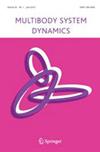Variational integrators and graph-based solvers for multibody dynamics in maximal coordinates
IF 2.4
2区 工程技术
Q2 MECHANICS
引用次数: 0
Abstract
Abstract Multibody dynamics simulators are an important tool in many fields, including learning and control in robotics. However, many existing dynamics simulators suffer from inaccuracies when dealing with constrained mechanical systems due to unsuitable integrators with bad energy behavior and problematic constraint violations, for example in contact interactions. Variational integrators are numerical discretization methods that can reduce physical inaccuracies when simulating mechanical systems, and formulating the dynamics in maximal coordinates allows for easy and numerically robust incorporation of constraints such as kinematic loops or contacts. Therefore, this article derives a variational integrator for mechanical systems with equality and inequality constraints in maximal coordinates. Additionally, efficient graph-based sparsity-exploiting algorithms for solving the integrator are provided and implemented as an open-source simulator. The evaluation of the simulator shows improved physical accuracy due to the variational integrator and the advantages of the sparse solvers. Comparisons to minimal-coordinate algorithms show improved numerical robustness, and application examples of a walking robot and an exoskeleton with explicit constraints demonstrate the necessity and capabilities of maximal coordinates.

最大坐标下多体动力学的变分积分器和基于图的求解方法
多体动力学模拟器是机器人学习和控制等诸多领域的重要工具。然而,许多现有的动力学模拟器在处理受约束的机械系统时,由于不合适的积分器具有不良的能量行为和有问题的约束违反,例如在接触相互作用中,存在不准确性。变分积分器是一种数值离散化方法,可以在模拟机械系统时减少物理不准确性,并且在最大坐标中制定动力学,可以轻松且在数值上健壮地结合约束,如运动回路或接触。因此,本文导出了在极大坐标下具有相等和不等式约束的机械系统的变分积分器。此外,还提供了用于求解积分器的高效的基于图的稀疏性利用算法,并作为开源模拟器实现。仿真结果表明,由于变分积分器和稀疏解算器的优点,该仿真器的物理精度得到了提高。与最小坐标算法的比较表明,该算法具有更好的数值鲁棒性,并通过具有明确约束的步行机器人和外骨骼的应用实例证明了最大坐标算法的必要性和能力。
本文章由计算机程序翻译,如有差异,请以英文原文为准。
求助全文
约1分钟内获得全文
求助全文
来源期刊
CiteScore
6.00
自引率
17.60%
发文量
46
审稿时长
12 months
期刊介绍:
The journal Multibody System Dynamics treats theoretical and computational methods in rigid and flexible multibody systems, their application, and the experimental procedures used to validate the theoretical foundations.
The research reported addresses computational and experimental aspects and their application to classical and emerging fields in science and technology. Both development and application aspects of multibody dynamics are relevant, in particular in the fields of control, optimization, real-time simulation, parallel computation, workspace and path planning, reliability, and durability. The journal also publishes articles covering application fields such as vehicle dynamics, aerospace technology, robotics and mechatronics, machine dynamics, crashworthiness, biomechanics, artificial intelligence, and system identification if they involve or contribute to the field of Multibody System Dynamics.

 求助内容:
求助内容: 应助结果提醒方式:
应助结果提醒方式:


